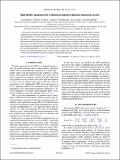High-fidelity quantum state evolution in imperfect photonic integrated circuits
Author(s)
Mower, Jacob; Steinbrecher, Gregory R.; Lahini, Yoav; Harris, Nicholas Christopher; Englund, Dirk Robert
DownloadPhysRevA.92.032322.pdf (837.7Kb)
PUBLISHER_POLICY
Publisher Policy
Article is made available in accordance with the publisher's policy and may be subject to US copyright law. Please refer to the publisher's site for terms of use.
Terms of use
Metadata
Show full item recordAbstract
We propose and analyze the design of a programmable photonic integrated circuit for high-fidelity quantum computation and simulation. We demonstrate that the reconfigurability of our design allows us to overcome two major impediments to quantum optics on a chip: it removes the need for a full fabrication cycle for each experiment and allows for compensation of fabrication errors using numerical optimization techniques. Under a pessimistic fabrication model for the silicon-on-insulator process, we demonstrate a dramatic fidelity improvement for the linear optics controlled-not and controlled-phase gates and, showing the scalability of this approach, the iterative phase estimation algorithm built from individually optimized gates. We also propose and simulate an experiment that the programmability of our system would enable: a statistically robust study of the evolution of entangled photons in disordered quantum walks. Overall, our results suggest that existing fabrication processes are sufficient to build a quantum photonic processor capable of high-fidelity operation.
Date issued
2015-09Department
Massachusetts Institute of Technology. Department of Electrical Engineering and Computer Science; Massachusetts Institute of Technology. Department of PhysicsJournal
Physical Review A
Publisher
American Physical Society
Citation
Mower, Jacob, Nicholas C. Harris, Gregory R. Steinbrecher, Yoav Lahini, and Dirk Englund. "High-fidelity quantum state evolution in imperfect photonic integrated circuits." Phys. Rev. A 92, 032322 (September 2015). © 2015 American Physical Society
Version: Final published version
ISSN
1050-2947
1094-1622